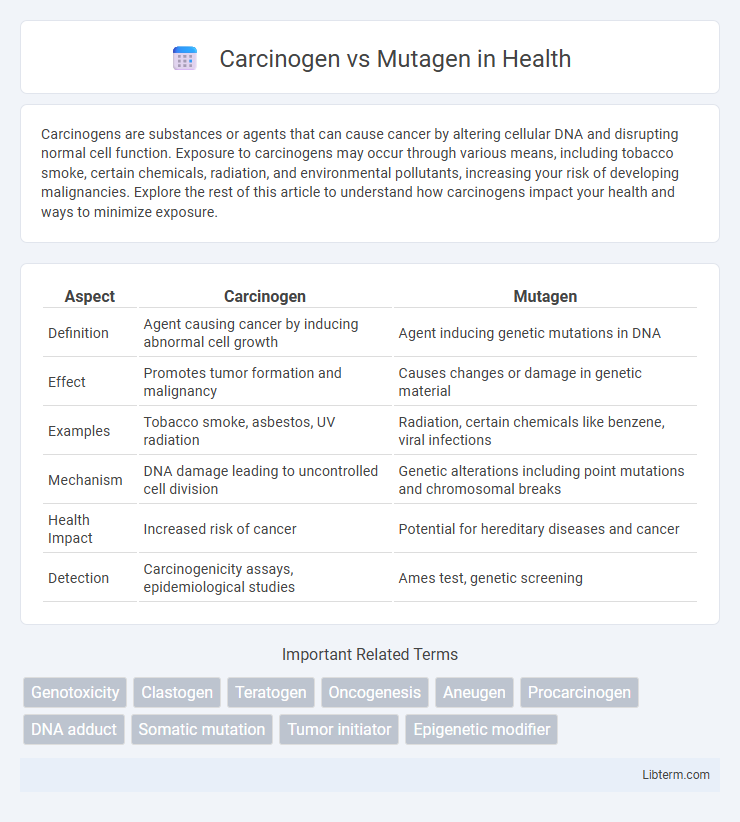Carcinogens are substances or agents that can cause cancer by altering cellular DNA and disrupting normal cell function. Exposure to carcinogens may occur through various means, including tobacco smoke, certain chemicals, radiation, and environmental pollutants, increasing your risk of developing malignancies. Explore the rest of this article to understand how carcinogens impact your health and ways to minimize exposure.
Table of Comparison
| Aspect | Carcinogen | Mutagen |
|---|---|---|
| Definition | Agent causing cancer by inducing abnormal cell growth | Agent inducing genetic mutations in DNA |
| Effect | Promotes tumor formation and malignancy | Causes changes or damage in genetic material |
| Examples | Tobacco smoke, asbestos, UV radiation | Radiation, certain chemicals like benzene, viral infections |
| Mechanism | DNA damage leading to uncontrolled cell division | Genetic alterations including point mutations and chromosomal breaks |
| Health Impact | Increased risk of cancer | Potential for hereditary diseases and cancer |
| Detection | Carcinogenicity assays, epidemiological studies | Ames test, genetic screening |
Introduction to Carcinogens and Mutagens
Carcinogens are substances or agents that promote the development of cancer by causing uncontrolled cell growth, often through genetic damage or cellular impairment. Mutagens are agents that induce genetic mutations by altering the DNA sequence, which may lead to harmful effects including cancer. Understanding carcinogens and mutagens is crucial for assessing cancer risk and developing preventive strategies in public health and environmental safety.
Defining Carcinogens
Carcinogens are substances or agents that directly contribute to cancer development by causing uncontrolled cell growth and tumor formation in living tissues. These agents can be chemical compounds, radiation, or certain viruses that induce mutations or disrupt cellular processes, leading to malignancy. Understanding carcinogens involves identifying their sources, mechanisms of action, and exposure levels that increase cancer risk in humans.
Defining Mutagens
Mutagens are agents, such as chemicals, radiation, or viruses, that cause changes or mutations in the DNA sequence of an organism, potentially leading to genetic disorders or cancer. Unlike carcinogens, which directly induce cancer through various mechanisms, mutagens specifically alter the genetic material at the molecular level, increasing the mutation rate. Understanding mutagens is crucial for genetic research, toxicology, and evaluating environmental risks associated with exposure to DNA-altering substances.
Key Differences Between Carcinogens and Mutagens
Carcinogens are substances or agents that specifically induce cancer by causing uncontrolled cell growth, whereas mutagens directly cause genetic mutations in DNA, which may or may not lead to cancer. The primary distinction lies in their effects: carcinogens promote tumor formation, while mutagens alter genetic material, increasing the risk of mutations that can result in cancer. Understanding these differences helps in risk assessment, regulatory policies, and the development of targeted prevention strategies for cancer and genetic disorders.
Common Examples of Carcinogens
Common examples of carcinogens include tobacco smoke, asbestos, ultraviolet (UV) radiation, and certain chemicals such as benzene and formaldehyde. These agents contribute to cancer development by causing direct damage to DNA or disrupting cellular processes. While mutagens specifically cause genetic mutations, carcinogens may cause mutations or promote uncontrolled cell growth through various mechanisms.
Common Examples of Mutagens
Common examples of mutagens include chemical agents such as benzene, formaldehyde, and aflatoxins, as well as physical agents like ultraviolet (UV) radiation and ionizing radiation from X-rays or radioactive materials. Biological mutagens encompass certain viruses like Human Papillomavirus (HPV) and bacteria such as Helicobacter pylori, which can induce genetic mutations leading to cellular changes. These mutagens alter the DNA sequence, increasing the risk of mutations that may result in cancer, distinguishing them from carcinogens that directly cause cancer without necessarily causing mutations.
How Carcinogens Cause Cancer
Carcinogens cause cancer by inducing genetic mutations that disrupt normal cell growth and division, leading to uncontrolled proliferation. These substances can directly damage DNA or create reactive oxygen species that result in cellular mutations. Persistent exposure to carcinogens increases the risk of tumor formation and malignancies in various tissues.
How Mutagens Cause Genetic Mutations
Mutagens cause genetic mutations by altering the DNA sequence within cells, often through mechanisms such as base substitutions, insertions, deletions, or cross-linking of DNA strands. These changes can disrupt normal gene function and lead to errors during DNA replication or transcription. Unlike carcinogens, which specifically promote cancer development, mutagens broadly increase the rate of genetic mutations, some of which may contribute to carcinogenesis if they affect oncogenes or tumor suppressor genes.
Health Risks and Prevention Strategies
Carcinogens are agents that directly contribute to the formation of cancer by causing abnormal cell growth, while mutagens induce genetic mutations that may lead to cancer or hereditary diseases. Health risks associated with exposure to carcinogens such as tobacco smoke, asbestos, and certain chemicals include increased incidence of lung, skin, and bladder cancers, whereas mutagens like radiation and some viruses trigger DNA alterations with potential multi-generational consequences. Prevention strategies emphasize minimizing exposure through regulatory controls, using protective equipment, routine screenings, and promoting lifestyle changes like smoking cessation and a diet rich in antioxidants to reduce oxidative DNA damage.
Conclusion: Understanding Carcinogens vs Mutagens
Carcinogens are substances or agents that directly cause cancer by inducing uncontrolled cell growth, while mutagens primarily cause genetic mutations that may lead to cancer. Understanding the distinction between carcinogens and mutagens is crucial for assessing environmental risks and developing targeted prevention strategies. Effective regulatory policies rely on identifying both carcinogenic and mutagenic properties to minimize human exposure and protect public health.
Carcinogen Infographic

 libterm.com
libterm.com